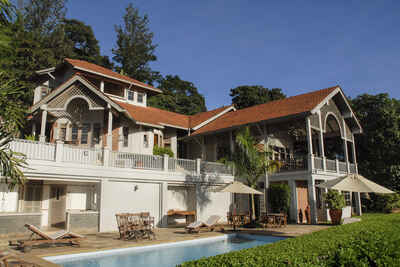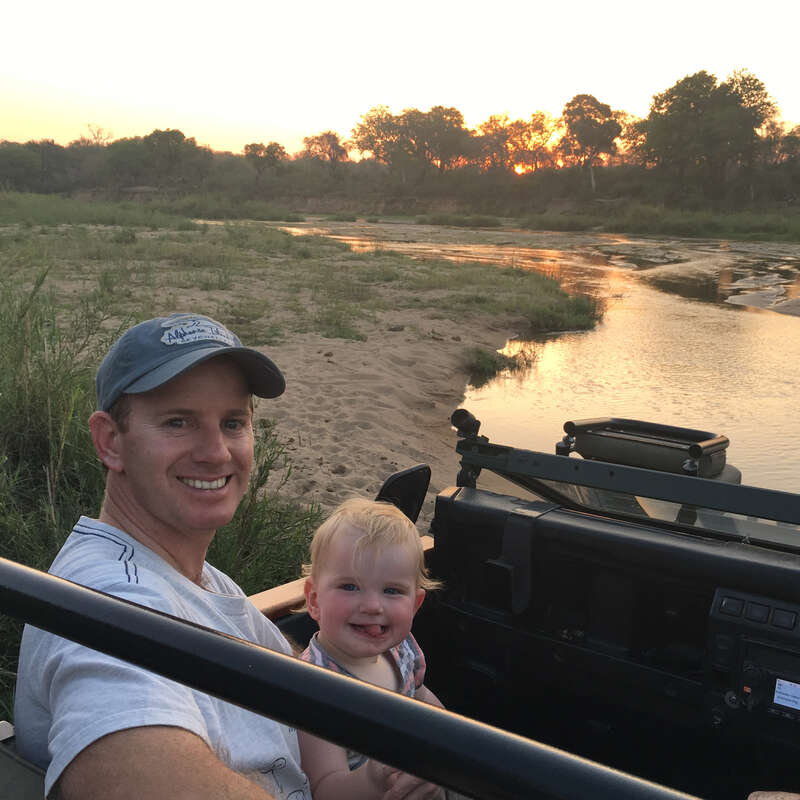About Onsea House
Onsea House (its full name is Onsea House Country Inn and Guest Cottage) is a renovated colonial-era property, ...
... with just four bedrooms. It opened as a guest house in 2006. Together with its sister property Machweo Wellness Retreat and Fine Dining, on the same plot – and a new sibling property Siringit, also near Arusha – it has a reputation for producing some of the best food in the region. The house is owned and run by the Janssens-Onsea family, from Belgium, with the very experienced cousin Axel Janssens in charge as Chef-Manager.
Onsea House is a small and personal property. It may not have the most luxurious rooms in Arusha, but the food in the Machweo restaurant is fantastic and the overall set-up very comfy and relaxing. As a result it would be one of our favourite places to stay in the area were it not trumped by Machweo itself.
Our view
Onsea House is a small and personal property. It may not have the most luxurious rooms in Arusha, but the food in the Machweo restaurant is fantastic and the overall set-up very comfy and relaxing. As a result it would be one of our favourite places to stay in the area were it not trumped by Machweo itself.
Accommodation
4 bedrooms
Children
Fine for all ages.
Open
16 May to 15 Apr
Traveller reviews of Onsea House
32 real, un-edited reviews from Expert Africa's travellers.
Arrived 21 Dec 2016, 1 nights
"Very comfortable"
Overall rating: Good
Arrived 17 Jul 2016, 1 nights
"perfect start to the holiday"
Overall rating: Excellent
Arrived 15 Sep 2015, 2 nights
"Great stay at Onsea House"
Overall rating: Excellent
Arrived 10 Sep 2015, 1 nights
"Beautiful Room with a Great View"
Overall rating: Good
Arrived 15 Aug 2015, 1 nights
"Great place to begin rested."
Overall rating: Excellent
Arrived 19 Jan 2015, 1 nights
"Arusha stop over"
Overall rating: Good
Arrived 22 Sep 2014, 1 nights
"A day room at Onsea House"
Overall rating: Excellent
Arrived 1 Sep 2014, 1 nights
"Fine for 1 night stay"
Overall rating: Good
Arrived 1 Sep 2014, 1 nights
"Onsea House review"
Overall rating: Average
Arrived 27 Aug 2014, 2 nights
"Onsea House review"
Overall rating: Good

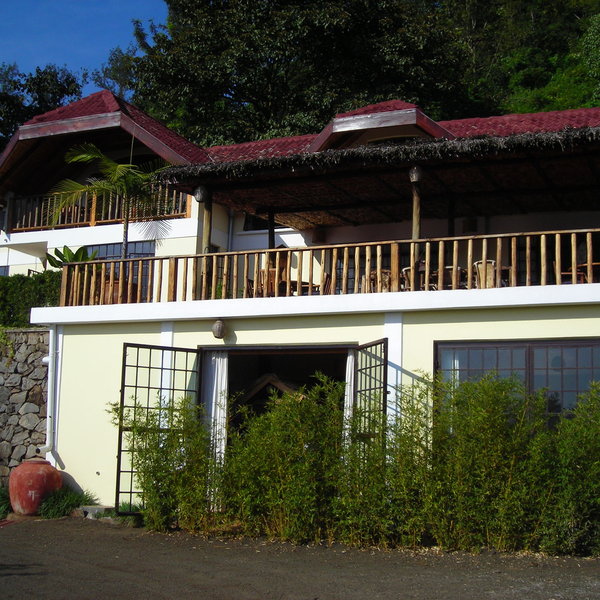
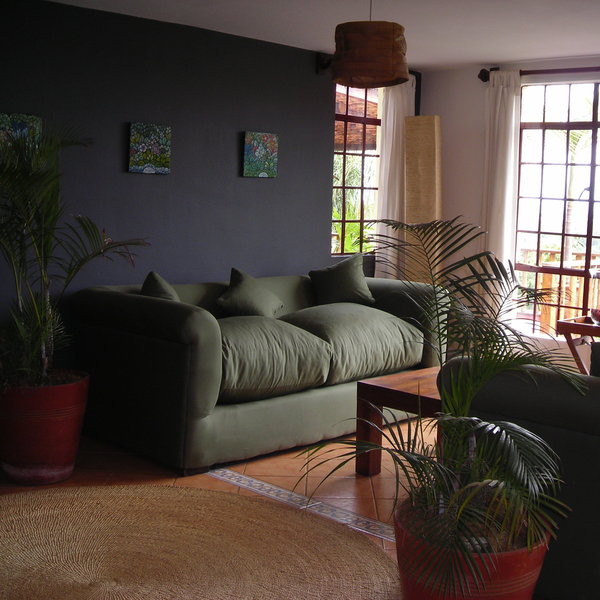
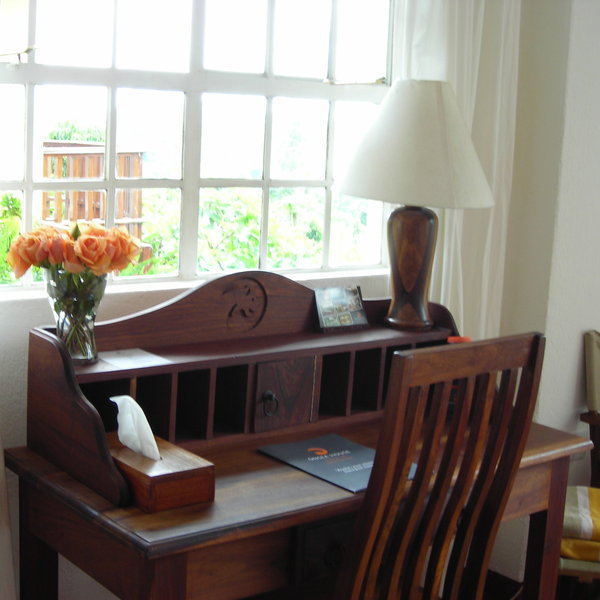


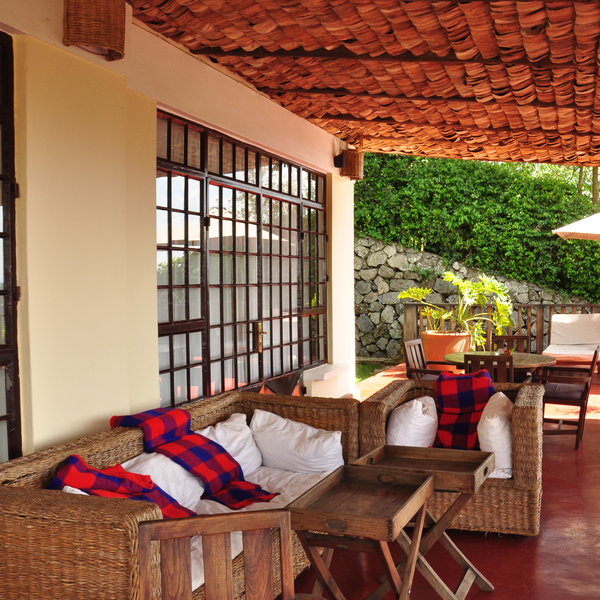
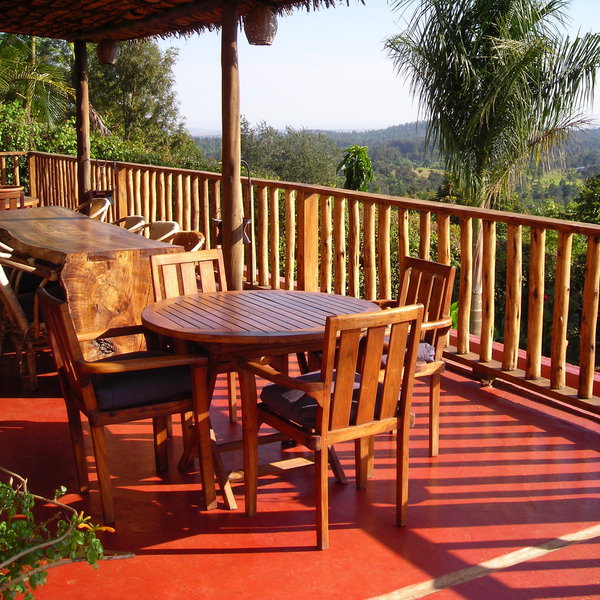

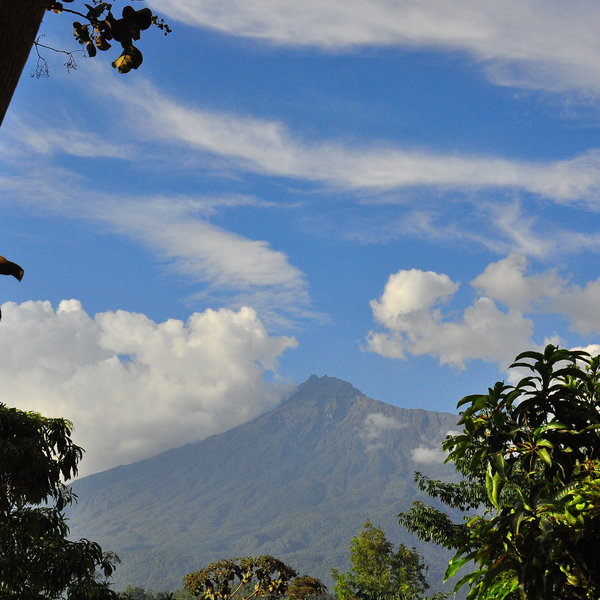
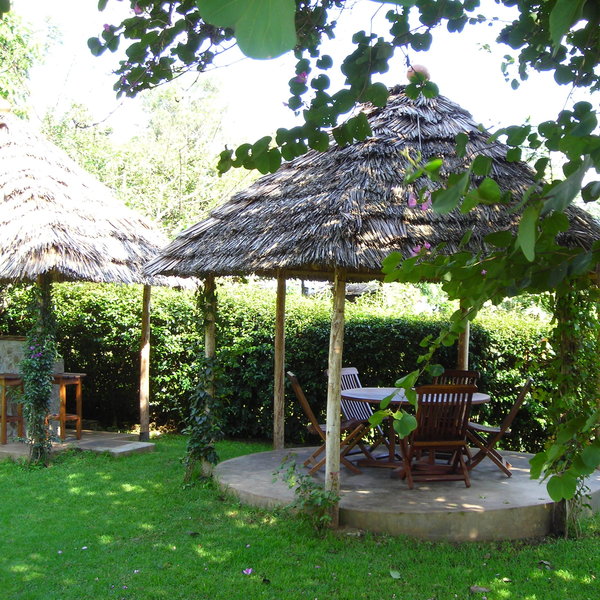

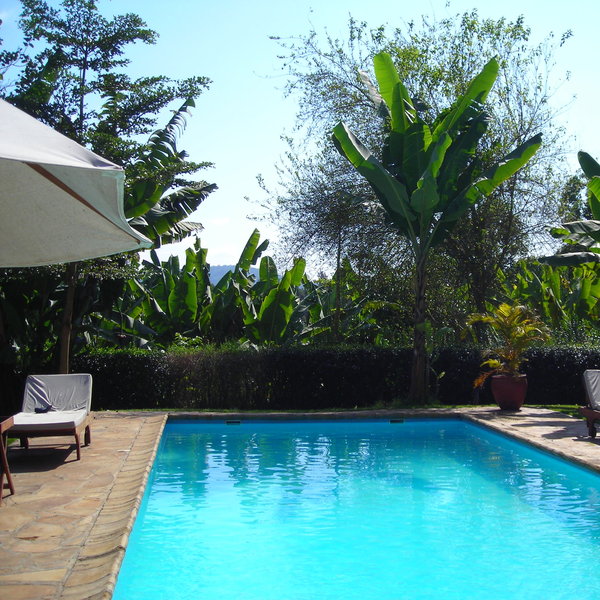
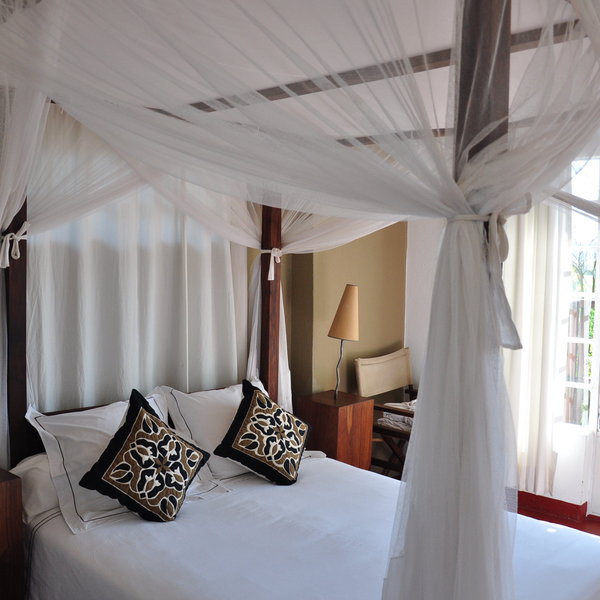
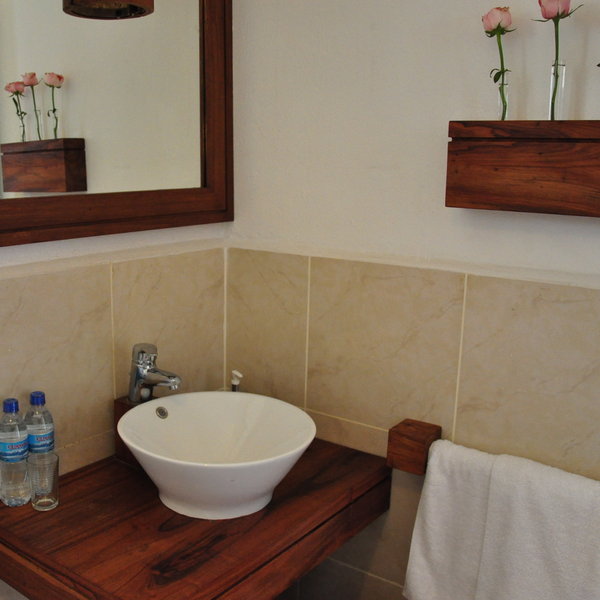

Expert Africa's gallery
When we travel we take lots of photos ourselves to give you a real and un-edited view of the trips. See our 16 pictures of Onsea House to get the candid view.
View galleryOnsea House: Our full report
Onsea House (its full name is Onsea House Country Inn and Guest Cottage) is a renovated colonial-era property, ...
... with just four bedrooms. It opened as a guest house in 2006. Together with its sister property Machweo Wellness Retreat and Fine Dining, on the same plot – and a new sibling property Siringit, also near Arusha – it has a reputation for producing some of the best food in the region. The house is owned and run by the Janssens-Onsea family, from Belgium, with the very experienced cousin Axel Janssens in charge as Chef-Manager.
Onsea House has a great atmosphere – you feel as though you're a guest in someone's home, as indeed you more or less are. It is relaxed, personal and comfortable. The lodge is not overly luxurious, but has a simple understated style that gently blends African and European design.
The main house sits at the top of a steep driveway, past a foliage-swathed dry rock wall. At ground level, through wide doors opening out onto the driveway, is the downstairs bar area. This includes a pool table and a long wooden bar with bar stools. A variety of cocktails are on offer here, as well as local and international beers, a good wine list, Champagne and various spirits.
Above this is the outside roof terrace, set with tables and chairs for dining, and a sofa and loungers. From here you can look out across the Maasai steppe and on a clear day you can see Mount Meru – the views are lovely.
From the upstairs roof terrace, walk inside to the upstairs bar and lounge, with its pair of vast and comfortable sofas. Wood carvings, flower arrangements and Tingatinga paintings (the bright, naive style founded by Edward Said Tingatinga) add an African slant to the décor, while tiled floors and clean lines add a European minimalist touch.
There are two double bedrooms inside the main house, and a further two rooms in a separate cottage in gardens lower down. It is only a minute's walk to reach this separate cottage, close to Onsea House's sparkling swimming pool. However there are some quite steep and irregular stone steps to walk down here.
All four of Onsea House's bedrooms are broadly the same, though in terms of space and privacy we slightly preferred the ones in the cottage – as they have the advantage of more communal lounging space, as well as being close to the pool. That said, anyone with slight mobility problems would be best advised to stay in the main house, thus avoiding the additional stairs. In fact, Room #1 is somewhat wheelchair-adapted (one of the owners' family members uses a wheelchair and often visits).
None of Onsea's four rooms is particularly large or luxurious, but the furnishings are well made – four-poster, Swahili-style beds with mosquito nets, and wooden writing desks in each room – and each room also has bathrobes, pool towels, a digital safe and a hairdryer. The rooms don't have air-conditioning because Arusha generally has moderate temperatures throughout the year.
The en-suite bathrooms have cream floor tiles and white walls. Each has a bath and shower, a flush loo and a basin. They're quite spacious and bright, and include Gilchrist and Soames toiletries.
During our last visit, in April 2015, it became clear that the Onsea House rooms are used less and less – unless specifically requested or when sister lodge Machweo is full. The cottage rooms could do with a lick of paint, while those in Machweo are more contemporary and have beautiful furnishings and bathrooms.
One of the main reasons to stay at either Machweo or Onsea is for the food, which has made the Machweo restaurant a favourite evening spot with locals and expats. Axel has experience at a Michelin-starred restaurant, and he specializes in Belgian- and French-influenced food, mixed with traditional Tanzanian flavours.
Activities
Families & children
- Attitude towards children
- Children are welcome at Onsea House. The owners, who are not always there, have a young family.
- Property’s age restrictions
- There are no age restrictions.
- Special activities & services
- With advance notice, babysitting can be provided from housekeeping.
- Equipment
- Some toys and DVDs, plus baby cots and highchairs are available.
- Generally recommended for children
- Yes – the lodge is informal and friendly and has a lovely swimming pool. If you're staying in Onsea House, you will also be able to use the pool at Machweo.
Food & drink
- Usual board basis
- Half Board
- Food quality
- One of the biggest reasons to stay at Onsea House is the food, which is prepared and cooked by the Michelin-experienced Axel, cousin to Dirk and Inneke. The food is Belgian/French-influenced, and is very tasty!
Onsea House offer a vast continental spread for breakfast. Guests can expect a range of bread, cheese, cold meat and sausage. You can also order your choice of egg-centric cooked breakfast.
Lunch is very flexible and you can request what they want depending on what is seasonally available. There is usually a choice of main courses and desserts, as well as lighter dishes and salads. We ate a delicious salad of huge, golden avocado slices with roasted carrots, spinach and sesame. The meal was deliciously light and very tasty – perfect for lunch.
Dinner is a longer and more drawn out affair that can last a few hours, with a number of courses. Guests can usually expect a soup starter, a main course, desert, cake and chocolates with coffee.
With both lunch and dinner, wines are chosen to compliment the meals. With a varied selection from South Africa, Italy and France the wines here are very good and is included at no extra charge during meals. - Dining style
- Individual Tables
- Dining locations
- Indoor and Outdoor Dining
- Further dining info, including room service
- Room service is available, at no extra charge.
- Drinks included
- Wine with meals is included, but all other drinks are extra.
Getting there
- Location
- Arusha, Tanzania
- Ideal length of stay
- One night if you are simply passing through Arusha and the beginning or end of your safari. However if you want a more leisurely stay you could easily spend two or three nights here.
- Directions
- Onsea House is located in a semi-rural setting, a 15–20-minute drive from Arusha and around 40 minutes from Kilimanjaro International Airport (JRO).
- Accessible by
- Fly-and-Transfer
Communications
- Power supply notes
- There is a back-up generator and inverter for Arusha's fairly frequent power cuts.
- Communications
- There is mobile phone reception and free wi-fi throughout most of the property, though guests are encouraged not to use their devices in public areas.
- TV & radio
- There is satellite TV in the downstairs bar.
- Water supply
- Other
- Water supply notes
- Water is pumped from the local river and goes through six filters, making the water used in the kitchen completely sterile. However, bottled drinking water is provided free of charge for guests.
Health & safety
- Malarial protection recommended
- Yes
- Medical care
- Onsea House has a first-aid kit on site. Four staff at Onsea and Machweo have received first-aid training. For more serious cases they are only a short drive from Arusha and a nearby hospital.
- Dangerous animals
- Low Risk
- Security measures
- Onsea House has a secure gate and askaris (guards) around the property day and night.
- Fire safety
- There are fire extinguishers inside and outside the main areas and most staff are trained to use them.
Useful info
- Disabled access
- On Request
- Laundry facilities
- Full Laundry Service - Extra Charge
- Money
- Limited foreign exchange can usually be arranged, but using an ATM in town is likely to be more cost-efficient.
- Accepted payment on location
- You can pay for your extras on checking out using US dollars Tanzanian shillings, British pounds or Euros in cash.
You can also use MasterCard and Visa credits cards, with no surcharge for this service.
Plan and book your trip with Expert Africa
All of our trips are tailor-made, so we'll always adapt them to suit you. Talk to an Expert and let us plan and arrange your perfect trip.

Talk to an Expert
Call or email us now! We’ll match you with the Specialist in our team who is best suited to help you. Then together we can start planning your trip.

Set up your itinerary
Based on our experience and your ideas, your specialist will create a detailed, costed itinerary. We’ll refine it together, until we have a trip that you’re perfectly happy with.

Prepare for your trip
The same Specialist will make the seamless arrangements for your trip, send you detailed travel documents, and be available to answer any questions before you depart.

Travel with peace of mind
After you set off, you’ll be cared for by our partners in Africa, most of whom have worked with Expert Africa for decades. And if you ever need us urgently, we’re available 24/7.

When you return
We love to learn about your trip, and so will always be grateful if you’ve the time to give feedback to your Specialist when you return.
Onsea House's location
Look closer at the environment and surroundings of Onsea House.
Excursions from Onsea House
Optional extra day-trips and excursions possible whilst you're staying at Onsea House. Talk to us: these are usually best arranged before you go.

Day Hike on Mount Kilimanjaro
Full day
Experience Africa’s highest mountain – in just a day. In the company of a private guide, hike through the forests of Mount Kilimanjaro’s western side to an altitude of 3,400m. From here, explore the Shira Plateau and its surroundings, perhaps spotting wildlife along the way.
More about Kilimanjaro Day Hike
Safari in Arusha National Park
Half day or full day
Arusha National Park offers some lovely walking in the foothills of Mount Meru and canoeing on the Momela Lakes, plus gentle game drives.
More about Safari in Arusha NPOther lodges in Arusha
Alternative places to stay in this same area.

Rivertrees Country Inn
Set within lush grounds, the peaceful and relaxing Rivertrees lies between Arusha and Kilimanjaro Airport: ideal at the beginning or end of a safari.

Arusha Coffee Lodge
Arusha Coffee Lodge is a neat, comfortable lodge, right on the highway, close to Arusha Airport. It is a convenient stop for a night.

Katambuga House
Katambuga House is a smart hotel on the western side of Arusha, an hour’s drive from Kilimanjaro Airport and 10 minutes from Arusha Airport.

Airport Planet Lodge
Airport Planet Lodge is a new hotel located close to Kilimanjaro Airport, making it ideal for a short stay before or after your international flight.

Machweo
Machweo is a nine-room lodge on the outskirts of Arusha. The rooms are large and stylish, and the service and food here are very good.

Kia Lodge
Kia Lodge is a simple, country-club-style lodge situated close to the buildings and runway of Kilimanjaro International Airport.

Hatari Lodge
Hatari Lodge is designed around a bright, fun 1960s retro theme and is a relatively high-quality base to explore Arusha National Park.

Mount Meru Game Lodge
Mount Meru Game Lodge, near Arusha, is a good spot to stay en route to northern Tanzania's most famous safari areas.

Legendary Lodge
Legendary Lodge is boutique luxury lodge, perfect for an indulgent overnight stay at the start or end of your safari.

Hamerkop House
Located halfway between Kilimanjaro Airport and Arusha, Hamerkop House is a small, peaceful stop either at the beginning or end of a safari.

Arusha Serena Hotel
The Serena Arusha Hotel is a comfortable hotel close to Lake Duluti. It makes a good stopover before or after a safari in northern Tanzania.

Twiga Lodge
Twiga is a Tudor-style lodge with welcoming owners, country-style gardens and a viewing platform looking onto Arusha National Park.

Siringit
Siringit Kilimanjaro Golf Safari Retreat is a six-bedroom villa offering a luxury stay in complete privacy on a championship golf course.
When to go to Arusha
Our month by month guide: What it's like to visit Onsea House in Arusha
Jan
Feb
Mar
Apr
May
Jun
Jul
Aug
Sep
Oct
Nov
Dec
Tanzania in January
January usually marks the start of the short dry season, although the exact timings of this are a little unpredictable. You can expect clear blue skies and sunshine, if the short rains have stopped, and the temperatures will be building. The short dry season is a little less pronounced in Southern Tanzania, and so it can still be wet in these areas. It is an interesting time for avians as resident birds go into breeding plumage and migrant species can be present.
Once the New Year busy period has quietened down, January can offer great value and quieter parks, although the weather can be variable, and in the Selous and Ruaha the wildlife is more dispersed.
- Variable weather: clear & dry or cloudy with some rain.
- Occasional thunderstorms may occur.
- A good time of year for birding as and many migrant species are around
- The wildebeest migration is gathering in the southern Serengeti.
- Busy in early January, quietening down through the month.
Our view
A good time to visit, with pros & cons
Weather in January
Tanzania in February
February is during the short dry season and is one of the hottest months in Tanzania, with temperatures reaching around 33°Celsius. This can be a good time to visit, as some areas of the Northern Circuit are comparatively quieter than during the European summer months, and lodge rates are also a little lower.
The wildebeest will typically be on the southern plains of the Serengeti for their calving season, which tends to occur in a 2-3 week window in early-mid February – although this does vary year on year. This is also a particularly rewarding time for birdlife, as northern hemisphere migrants join the resident species.
- Hot and dry weather.
- Wildebeest migration calving on Serengeti’s southern plains.
- Ngorongoro Crater and southern Serengeti busy for the migration.
- Selous and Ruaha are typically quiet at this time.
- The parks are likely to be lush and green, leading to pretty landscape
Our view
A very good time to visit
Weather in February
Tanzania in March
The heavier ‘long rains’ start in earnest in March although exactly when varies year on year. With no need to stay close to permanent water sources, migratory wildlife disperses, and so game viewing starts to become more challenging. This is most prominently seen in Tarangire National Park. The wildebeest migration may still be calving, or have moved on into the central regions of the Serengeti.
Many of the camps in the southern parks close mid March and mobile tented camps in the Serengeti will wind down towards the end of the month in order to move location or carry out refurbishments, ready for the new tourist season.
- Hot with building humidity, before the rains begin at some point.
- Wildlife viewing is variable depending on the start of the rains.
- Parks are quiet and rates are low.
- Not great for southern or western Tanzania.
- March can be a good time for birding, with many migrant species.
Our view
A good time to visit, with pros & cons
Weather in March
Tanzania in April
April is in the middle of the long rainy season and is the wettest month, with on average 250mm of rain. Temperatures are fairly high and humid in comparison to the rest of the year. Expect the bush to be lush and flowering, and alive with insects, birds and smaller animals. It is however also dense, allowing wildlife to hide, which in turn makes game viewing harder. This is a very quiet time in terms of visitor numbers.
Many of the tented camps are closed in April, however the larger lodges remain open. The rates are significantly cheaper, and so if you are willing to work harder to spot the bigger game, some accommodation bargains can be had.
- Heavy rain expected, with impressive thunderstorms and lightning.
- Many camps closed and roads impassable due to ground conditions.
- Rates are at their lowest all year round, with very few other tourists
- Places that are open are green and vibrant, wildlife more dispersed.
Our view
This is not a great time to visit
Weather in April
Tanzania in May
As Tanzania is close to the equator there is no dramatic difference in climate throughout the year, but temperatures do start to drop a little in May. The rains are likely to still be present, although potentially clearing towards the end of the month. Visitor numbers and lodge rates are still low. The wildebeest migration is making its way through the western regions of the Serengeti, crossing the Grumeti River.
Virtually all camps in southern Tanzania remain closed, and many of the roads and tracks in the Selous become impassable.
- Heavy rains and storms are likely, this can create some dramatic skies
- Blissfully quiet in northern Tanzania, and a good time to avoid crowds
- The parks are likely to look lush and green, with long grass.
- Wildlife is likely to be more dispersed, with fewer sightings.
- The low prices make safaris much more affordable at this time.
Our view
This is not a great time to visit
Weather in May
Tanzania in June
The rains come to an end at some point during the month and migratory wildlife begins to be drawn back to perennial water sources as the land starts to dry up. It’s likely that the parks will still be quite green and the grass high though, so walking and fly-camping may be unlikely. This marks the start of the season with camps reopening, but prices are still more affordable than the subsequent months.
The migration may still be in the Western Corridor, or on the move northwards towards the Mara River. Western Tanzania presents more challenging conditions for chimpanzee trekking in Mahale National Park, as the chimps are higher in the mountains.
- Variable weather: clear & dry or cloudy with some rain.
- A transitory time for the migration – moving from west to north.
- The parks may still be quite green, and grasses high.
- Wildlife may be dispersed still.
- Relatively low visitor numbers and good value, shoulder season prices.
Our view
A good time to visit, with pros & cons
Weather in June
Tanzania in July
July is considered to be the start of the peak season, with no rainfall expected and pleasant daytime temperatures. As the parks dry, the wildlife congregates in fewer areas, grass is eaten and trampled by the migration, and game viewing gets better and better. The wildebeest are typically arriving in the northern Serengeti, ready to begin their period of crossings of the Mara River.
In the Selous and Ruaha wildlife sightings can be fantastic, with animals gathering around the lakes and rivers. Great conditions and school holidays mean the parks are at their busiest, with Ngorongoro and the Serengeti particularly crowded.
- Dry and warm daytimes, chilly and windy in the mornings and evenings.
- Great wildlife viewing, as water sources diminish.
- The most popular time of year with very high visitor numbers.
- Prices are at their highest due to the great conditions on the ground.
- To avoid the crowds consider Tanzania’s southern parks.
Our view
Fantastic: the very best time to visit
Weather in July
Tanzania in August
August is the middle of the long dry season, with clear skies and sunny weather. You can expect some cooler weather at night and first thing in the morning. Remember to pack layered clothing, so you can wrap up warm on your early morning game drives, but remain comfortable as it heats up throughout the day.
August is a very popular time to visit, so accommodation prices are at their highest and advanced booking is necessary. It can get noticeably busier in some of the northern parks – in particular the Ngorongoro Crater and northern Serengeti, as visitors flock to the area in hope of witnessing an exciting migration river crossing.
- Dry and warm daytimes, chilly in the early mornings and evenings.
- General wildlife viewing should be excellent.
- An exciting time of year for the wildebeest migration.
- Certain areas will be very busy and camps fill up fast.
- Great wildlife sightings in the Selous and Ruaha, and fewer people.
Our view
Fantastic: the very best time to visit
Weather in August
Tanzania in September
September can be an excellent time of year to visit Tanzania. As the parks continue to dry up the wildlife becomes increasingly reliant on the remaining water sources, leading to high densities of animals. Whilst early September can be busy, with fewer families traveling at this time the parks typically become quieter as the month goes on.
You are still likely to see the wildebeest migration in the northern Serengeti, with river crossings occurring on a regular basis. Tanzania’s southern parks are also fantastic at this time of year, generally receiving far fewer visitors than the north, and wildlife sightings can be great. Prices remain high and the weather generally remains good.
- Wildlife viewing in September can be fantastic.
- Whilst still fairly busy, often the parks are typically a little quiet
- The parks will start to become very dry, with little new vegetation
- Cooler mornings and evenings, warming up during the day.
- Prices remain high.
Our view
Fantastic: the very best time to visit
Weather in September
Tanzania in October
At the tail end of the dry season, the wildlife should be the easiest to spot, although photographers should be aware that it can be a bit dusty at this time of year, as there has been no rain for several months. Great general wildlife viewing throughout as animals are attracted to remaining sources of water. Elephant numbers are particularly high at this time in Tarangire, and Mahale and Katavi are especially rewarding with frequent wildlife sightings close to camp.
There is a chance of rainfall towards the end of the month, if the short rains commence. While prices remain high, visitors numbers are significantly lower than in July-August.
- Mostly dry and temperatures comfortably warm, with the chance of storm
- Great game viewing although the landscape can be a bit barren.
- Much lower visitor numbers than the earlier months.
Our view
A very good time to visit
Weather in October
Tanzania in November
In November you can expect the start of the short rains, although the start date varies every year. The rains are highly localised, and are much lighter and more unpredictable than the long rains that occur earlier in the year. These should not really interfere with your safari – as the game viewing at this time is still good - but you should pack a waterproof jacket and be prepared for some short rain showers!
The majority of tented camps remain open, but some of the mobile camps in Northern Tanzania will close for the latter half on the month. Given the seasonality, camps are charging shoulder season rates so there are often some bargains to be had. Early November can offer great value for money and the weather conditions are likely to be comparable to late October.
- Variable weather: clear & dry or cloudy with some rain.
- Parks are comparatively quiet and prices at the lower end.
- Some camps will close towards the end of the month for maintenance.
- Good wildlife sightings, but animals will disperse when rain starts
- The wildebeest migration is on the move and the location unpredictable
Our view
A good time to visit, with pros & cons
Weather in November
Tanzania in December
December is also during the short rainy period, but this does not stop Tanzania being a popular destination to spend the festive period. Be aware that many of the lodges book up early, and charge peak rates over this time. Advanced booking is essential over this period, especially if travelling in larger family groups.
Travelling in December outside of the festive period allows travellers to make use of excellent shoulder season rates. Temperatures are pleasant with the averages of 27Celsius, although there is the chance of intermittent thunderstorms.
- Variable weather:clear & dry or cloudy with some rain and thunderstorm
- Good general game viewing in parks with low seasonality - Serengeti.
- Very quiet early in the month, becoming exceptionally busy.
- Prices reflect this – great value rising to the highest they are.
- The wildlife in southern Tanzania is more dispersed.
Our view
A good time to visit, with pros & cons
Weather in December

Looking for inspiration on where to travel next?
Visit our trip chooser to explore your options and find inspiration for your perfect African adventure
Inspire me